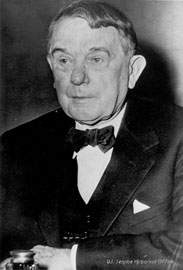Kenneth McKellar (politician)
Kenneth McKellar | |
|---|---|
George W. Gordon | |
| Succeeded by | Hubert Fisher |
| Personal details | |
| Born | Kenneth Douglas McKellar January 29, 1869 Dallas County, Alabama, U.S. |
| Died | October 25, 1957 (aged 88) Memphis, Tennessee, U.S. |
| Political party | Democratic |
| Alma mater | University of Alabama |
| Profession | Attorney |
Kenneth Douglas McKellar (January 29, 1869 – October 25, 1957) was an American politician from Tennessee who served as a United States Representative from 1911 until 1917 and as a United States Senator from 1917 until 1953. A Democrat, he served longer in both houses of Congress than anyone else in Tennessee history.
Only a few other congressmen in American history have served longer in both houses.
Early life and career
McKellar was a native of Dallas County, Alabama. He graduated from the University of Alabama in 1891 and its law school in 1892.
He moved to
He was a presidential elector in 1904.[1]
United States Senate
McKellar ran for the Senate in
McKellar was considered a moderate progressive in his early days in the Senate, and he supported many of President
Kenneth McKellar was a crusader for
As ranking member of the
McKellar's threat to withhold funding for purchases of uranium had a much deeper meaning, though. Lilienthal was also closely associated with the Manhattan Project's work to electromagnetically enrich uranium, coincidentally at the facility later known as Y-12.[3] Ernest Lawrence's "electromagnetic" enrichment of uranium at Oak Ridge would eventually use the electricity created by the TVA to enrich the uranium used in the atomic bomb dropped on Hiroshima. By threatening to withhold funding for the purchase of uranium, McKellar was demonstrating to Lilienthal that the politician, as ranking member and Acting Chairman of the Appropriations Committee, held the power. He forced Lilienthal to have the TVA pay fair market value for land it appropriated.
McKellar twice served as
Also, as the President pro tempore of the Senate had, prior to 1886, been second in the
McKellar also served as chairman of the Civil Service Committee, Post Office and Road Committee, and, most notably, the powerful Appropriations Committee from 1945–1947, and again from 1949–1953.[5]
Longevity
McKellar is the only Tennessee senator to have completed more than three full terms. Except for McKellar, Tennessee has generally not joined in the
Before the era of popular election of U.S. Senators, Senator William B. Bate was elected to a fourth term by the Tennessee General Assembly, but he died five days into this term, while Senator Isham G. Harris also died early in his fourth term. Senator Joseph Anderson was elected by the General Assembly to three full terms plus the balance of the term of William Blount, who had been expelled from the Senate.
1952 election

In 1952 McKellar stood for a seventh term (the first Senator to do so), despite being 83. He was opposed for renomination by
McKellar's defeat was part of a statewide trend of change in 1952. That year incumbent governor of Tennessee Gordon Browning was defeated by Frank G. Clement. Browning, who had served a total of three terms as governor, the last two successive, had also at one point been a close ally of Crump's but had since broken ranks with him. As Clement and Gore were both considerably younger and regarded as more progressive than their predecessors, some historians cite the 1952 elections as an indication that Tennessee entered into the "New South" era of Southern politics earlier than most of the other Southern states.
Legacy
McKellar wrote a book about his Tennessee predecessors in the Senate called Tennessee Senators as Seen by One of Their Successors (1942). In recent years it has been updated by one of his successors, former
McKellar died on October 25, 1957. He is interred at Elmwood Cemetery in Memphis, Tennessee.[6]
Representation in other media
Some have speculated that Senator McKellar was the inspiration for the character South Carolina Senator Seabright Cooley in Allen Drury's novel Advise and Consent.[7]
McKellar was portrayed by actor/country singer Ed Bruce in the film Public Enemies (2009) and Michael O'Neill in the film J. Edgar (2011).
References
- ^ The National Cyclopædia of American Biography. Vol. C. New York, N.Y.: James T. White & Company. 1930. p. 427 – via HathiTrust.
- ^ "Kenneth D. McKellar". Tennessee Historical Society. Retrieved 2 May 2013.
- ^ "Manhattan Project: The Uranium Path to the Bomb, 1942-1944". www.osti.gov. Retrieved 2022-02-10.
- ^ "Kenneth D. McKellar". Biographical Directory of the United States Congress. Retrieved 2 May 2013.
- ^ "Kenneth D. McKellar". Govtrack US Congress. Retrieved 2 May 2013.
- ^ "Kenneth D. McKellar". The Political Graveyard. Retrieved 2 May 2013.
- ^ David, personalName=Bratman. "The fictional Senate of Allen Drury's Advise and consent". Archived from the original on 17 July 2019. Retrieved 20 October 2016.
External links
- United States Congress. "Kenneth McKellar (id: M000499)". Biographical Directory of the United States Congress.
- Kenneth McKellar at Find a Grave


